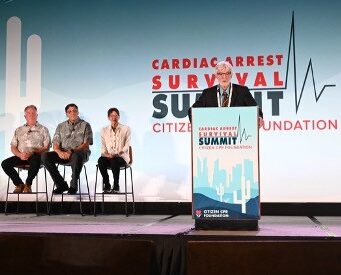A recent Town Hall Meeting convened by the American Heart Association, in partnership with the Citizen CPR Foundation and the National Association of EMS Physicians, focused on racial and ethnic inequities in out-of-hospital cardiac arrest outcomes.
The webinar, with Marina Del Rios, MD as a key organizer, followed a two-part program. The first part of the program saw CCPRF President Dr. Stu Berger moderate a panel of four resuscitation and EMS research experts who addressed:
- Epidemiological overview and health inequities in OHCA survival outcomes
- Potential gaps in the collection and reporting of data
- A frontline provider’s perspective on the challenges with EMS data collection and
- quality assurance, and
- Solutions for improved data collection and reporting
Following the presentations by Sumeet Chugh, MD, Robert Rodriguez, MD, Remle Crowe, PhD, and Clay Mann, PhD, attendees participated in breakout room discussions, offering perspectives and insights about data collection barriers and potential areas of improvement.
A continually growing collection of data tells a stark story: race, income and geographic location, among other factors, can have an adverse effect on outcomes, including decreased use of bystander CPR and AEDs and, ultimately, lower survival rates among Black and non-white populations.
“When it comes to health, our zip code matters more than our genetic code,” said Remle P. Crowe, PhD, NREMT, Director of Clinical and Operational Research, ESO.
These inequities are deeply embedded in our communities, our healthcare system and beyond. Yet that doesn’t mean that we can’t each take action to help prompt meaningful change and help increase survival rates.
Dr. Rodriguez’s presentation raised the following question and recommendations: “How do we address OHCA disparities?”
- Promote recognition of cardiac arrest and other critical illness and the understanding for the need to call 911
- Promote CPR in diverse communities
- Increase availability of AEDs in diverse communities
- Widespread distribution of naloxone
- Address EMS and hospital proximity issues
For further information on training, awareness and advocacy efforts for your community, you can access a free toolkit for Engaging Communities created by the American Heart Association.
This Town Hall is the first in a series of discussions that will continue to address inequities in OHCA. Connect with the American Heart Association and the Citizen CPR Foundation to get alerts when future Town Halls are scheduled.
If you live shouldn’t depend on where you live. Let’s change this. Together.



